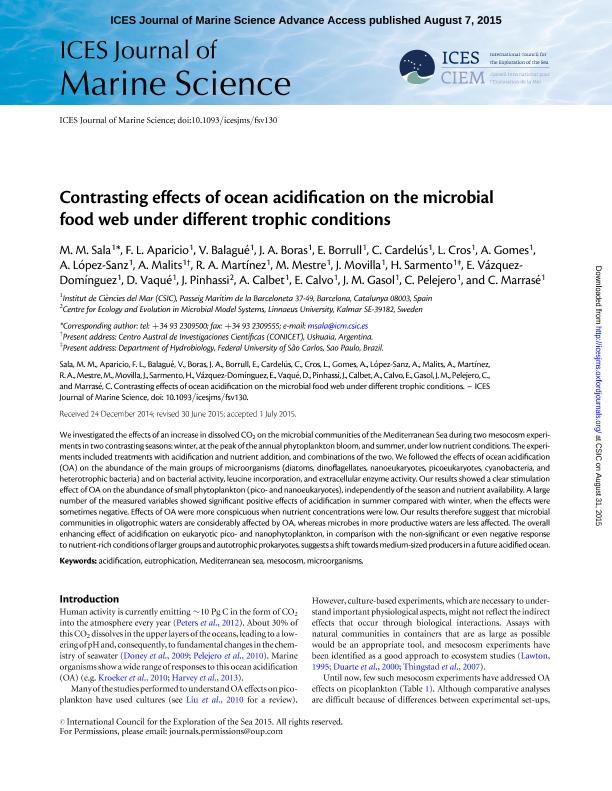Artículo
Contrasting effects of ocean acidification on the microbial food web under different trophic conditions
Montserrat Sala, M. M.; Aparicio Bernat, F. L.; Balague, V.; Boras, J. A.; Borull, E.; Cardelús, C; Cros, L.; Gomes, A.; López Sanz, A.; Malits, Andrea ; Martínez, R. A. ; Mestre, M.; Movilla, J.; Sarmento, H.; Vázquez Domínguez, E.; Vaqué, D.; Pinhassi, J.; Calbet, A.; Calvo, E.; Gasol, J. M.; Pelejero, C.; Marrase, C.
; Martínez, R. A. ; Mestre, M.; Movilla, J.; Sarmento, H.; Vázquez Domínguez, E.; Vaqué, D.; Pinhassi, J.; Calbet, A.; Calvo, E.; Gasol, J. M.; Pelejero, C.; Marrase, C.
 ; Martínez, R. A. ; Mestre, M.; Movilla, J.; Sarmento, H.; Vázquez Domínguez, E.; Vaqué, D.; Pinhassi, J.; Calbet, A.; Calvo, E.; Gasol, J. M.; Pelejero, C.; Marrase, C.
; Martínez, R. A. ; Mestre, M.; Movilla, J.; Sarmento, H.; Vázquez Domínguez, E.; Vaqué, D.; Pinhassi, J.; Calbet, A.; Calvo, E.; Gasol, J. M.; Pelejero, C.; Marrase, C.
Fecha de publicación:
08/2015
Editorial:
Oxford University Press
Revista:
Ices Journal Of Marine Science
ISSN:
1054-3139
Idioma:
Inglés
Tipo de recurso:
Artículo publicado
Clasificación temática:
Resumen
We investigated the effects of an increase in dissolved CO2 on the microbial communities of the Mediterranean Sea during two mesocosm experiments in two contrasting seasons: winter, at the peak of the annual phytoplankton bloom; and summer, under low-nutrient conditions. The experiments included treatments with acidification and nutrient addition, and combinations of the two. We followed the effects of ocean acidification on the abundance of the main groups of microorganisms: diatoms, dinoflagellates, nanoeukaryotes, picoeukaryotes, cyanobacteria, heterotrophic bacteria; as well as bacterial activities, leucine incorporation and extracellular enzyme activity. Our results showed a clear stimulation effect of ocean acidification on the abundance of small phytoplankton (pico- and nanoeukaryotes), independently of the season and nutrient availability. An important number of the measured variables showed significant positive effects of acidification in summer compared to winter, when the effects were sometimes negative. Effects of ocean acidification were more conspicuous when nutrient concentrations were low. Our results suggest, therefore, that microbial communities in oligotrophic waters will be considerably affected by ocean acidification, whereas microbes in more productive waters will exhibit a lower response to a pH decrease. The overall enhancing effect of acidification on eukaryotic small pico- and nanophytoplankton, in comparison to the non-significant or even negative response of larger groups and autotrophic prokaryotes under nutrient-rich conditions, suggests a shift towards medium-sized producers in a future acidified ocean.
Palabras clave:
Acidification
,
Eutrophication
,
Mediterranean Sea
,
Mesocosm
,
Microorganisms
Archivos asociados
Licencia
Identificadores
Colecciones
Articulos(CADIC)
Articulos de CENTRO AUSTRAL DE INVESTIGACIONES CIENTIFICAS
Articulos de CENTRO AUSTRAL DE INVESTIGACIONES CIENTIFICAS
Citación
Montserrat Sala, M. M.; Aparicio Bernat, F. L.; Balague, V.; Boras, J. A.; Borull, E.; et al.; Contrasting effects of ocean acidification on the microbial food web under different trophic conditions; Oxford University Press; Ices Journal Of Marine Science; 73; 3; 8-2015; 670-679
Compartir
Altmétricas



